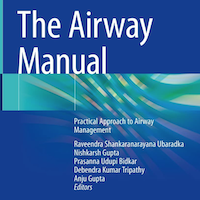
Disruptive Technology or Standard of Care?
The study and practice of medicine is constantly changing. Hospitals and specialty societies develop protocols and standards of care based on what is thought to be the best evidence and science at the time. Over the years,... read more

AI Can Predict Sepsis to Save Lives
Emory University researchers have created a "Sepsis Expert" algorithm that works in real time to predict the onset of sepsis, the deadly condition that often takes hold in healthcare settings. Banking on information from... read more

All Things Flu
Dr. Christopher Carroll and Dr. Jayshil Patel discussing all things flu on Reddit. They provide the facts, share the latest in research and help provide more information on how to best tackle this flu season. We are in the... read more

Risk Factors for Ventilator-Associated Events in a PICU
There is an association between ventilator-associated condition and infection-related ventilator-associated complication in critically ill children with acute kidney injury, ventilatory support, and neuromuscular blockade.... read more

Association of ICH Among Patients Taking Non–Vitamin K Antagonist vs Vitamin K Antagonist Oral Anticoagulants With In-Hospital Mortality
Among patients with ICH, prior use of NOACs or warfarin was associated with higher in-hospital mortality compared with no OACs. Prior use of NOACs, compared with prior use of warfarin, was associated with lower risk of in-hospital... read more

Differential Diagnosis Between Newly Diagnosed Asthma and COPD Using EBC Metabolomics
Asthma and chronic obstructive pulmonary disease (COPD) are heterogeneous diseases with high pathological burden and healthcare costs. In the outpatient clinical practice, an accurate differential diagnosis is often very... read more

Early Application of APRV May Reduce the Duration of Mechanical Ventilation in ARDS
Compared with LTV, early application of airway pressure release ventilation (APRV) in patients with ARDS improved oxygenation and respiratory system compliance, decreased Pplat and reduced the duration of both mechanical... read more

Advanced Hemodynamic and Cardiopulmonary Ultrasound for Critically Ill Patients
Focused echocardiography, advanced hemodynamic, and cardiopulmonary point-of-care ultrasound studies provide time-sensitive evaluation of critically ill patients, guiding and facilitating earlier implementation of life-preserving... read more

Managing Sepsis and Septic Shock Current Guidelines and Definitions
While sepsis defies simple definition, it's generally understood to be a clinical syndrome caused by infection that may have profound adverse physiologic consequences. Although its precise incidence is unknown, sepsis is... read more

Differences in Impact of Definitional Elements on Mortality Precludes International Comparisons of Sepsis Epidemiology
Within a sepsis cohort, we illustrate case-mix heterogeneity using definitional elements (infection source and organ dysfunction). In the context of improving outcomes, we illustrate differential secular trends in impact... read more

Monitoring ICU Performance-impact of a Novel Individualised Performance Scorecard in Critical Care Medicine
Patients admitted to a critical care medicine (CCM) environment, including an intensive care unit (ICU), are susceptible to harm and significant resource utilisation. Therefore, a strategy to optimise provider performance... read more

Enteral vs Parenteral Nutrition in Critical Care Requiring Mechanical Ventilation
Enteral feeding was not superior to parenteral feeding for early nutritional support in critically ill patients receiving mechanical ventilation and vasopressor support for shock, according to the results of a study published... read more

Prospective Evaluation of a Multifaceted Intervention to Improve Outcomes in Intensive Care
Studies comprehensively assessing interventions to improve team communication and to engage patients and care partners in ICUs are lacking. This study examines the effectiveness of a patient-centered care and engagement program... read more
Liberal Glycemic Control in Critically Ill Patients With Type 2 Diabetes
Ludwig Lin, MD, speaks with Palash Kar, MBBS, about the article, "Liberal Glycemic Control in Critically Ill Patients With Type 2 Diabetes: An Exploratory Study," published in Critical Care Medicine. In this article, Dr.... read more

Factors Associated with Life-Sustaining Treatment Restriction in the ICU
Few previous studies have investigated associations between clinical variables available after 24 hours in the ICU and decisions to restrict life-sustaining treatment. The aim of this study was to identify factors associated... read more

Ultrasonography in Trauma: a Nation-wide Cross-Sectional Investigation
The Focused Assessment with Sonography in Trauma (FAST) protocol is considered beneficial in emergent evaluation of trauma patients with blunt or penetrating injury and has become integrated into the Advanced Trauma Life... read more

The ADRENAL Trial: Steroids in Septic Shock
Randomized clinical trials evaluating the efficacy of adjunctive corticosteroids in septic shock have shown conflicting evidence of clinical relevance. Two trials in particular looked at lower dose hydrocortisone (200mg/day)... read more








